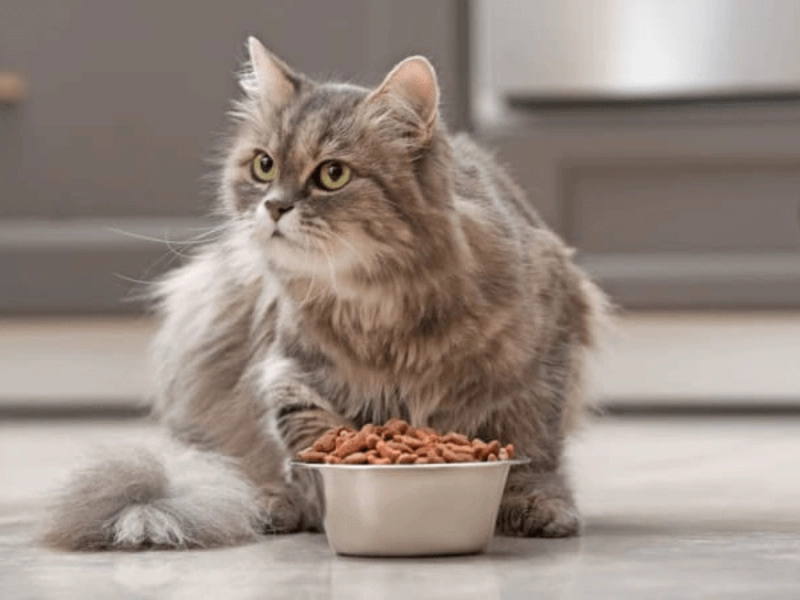Advertisement
6. Your Cat's Appetite Has Decreased

Advertisement
When it comes to feline health and well-being, a drop in appetite raises major questions. Unlike humans, who could deliberately decide to fast or diet for different reasons, cats depend on steady, regular diet to stay healthy. A cat's appetite clearly signals something is wrong and calls for quick care when it drastically declines or they stop eating entirely. From small momentary pain to more severe medical illnesses, this shift in eating behaviour might be suggestive of a broad spectrum of underlying problems.
A cat could lose appetite for a variety of causes. Illness or bodily pain is one of the most often occurring causes. Dental difficulties, gastrointestinal diseases, kidney illness, liver disease, or even cancer can all influence a cat's appetite. Reduced appetite can also result from pain from any source—internal problems, arthritis, or injury. Among the main symptoms of infections—both bacterial and viral—often loss of appetite is present. Furthermore, some drugs might have side effects that affect a cat's food interest.
Two other major causes of a cat's diminished appetite are stress and worry. Cats may become uncomfortable and less interested in food when their home surroundings change—that is, when they move to a new house, add a new pet or family member, or modify their daily schedule. Certain cats are more sensitive to changes in their diet or feeding schedule, which could cause a transient loss of appetite. A cat's inclination to eat can also be influenced by environmental stresses including loud noises, strange guests, or disputes with other household pets.
Additionally contributing to a drop in appetite can be age-related changes. Cats entering their senior years may naturally lose their sense of taste and scent, which would make food less appetising. Older cats are also more likely to have health concerns including kidney illness or dental problems that might compromise their eating. Senior cats' cognitive impairments also sometimes cause uncertainty about meal times or trouble finding food bowls, much as dementia in people does.
Should your cat's appetite drop, you should pay close attention to any other accompanying symptoms or behavioural changes. Are their water intake either higher or lower? Do they now have different litter box practices? Do they look bored or less motivated in their typical pursuits? These findings can direct your veterinarian's diagnosis and offer important hints regarding the fundamental reason of the appetite change.
See a veterinarian right away given the possible gravity of a reduced appetite, particularly if it lasts more than one day or two. A detailed picture of your cat's health status can be obtained by your veterinarian through further diagnostic testing such blood work, urinalysis, or imaging investigations; a thorough physical examination can assist uncover any clear health problems. Early intervention is crucial as, especially in overweight cats that run the danger of developing hepatic lipidosis (fatty liver disease) upon stopping food, lengthy periods without enough nourishment can cause major problems.
There are actions you might take to motivate your cat to eat in the interim. Presenting pleasant, aromatic foods can boost their appetite. To get them to eat, you might try several textures or flavours of cat food or even provide little amounts of plain, unseasoned cooked chicken or fish. Make sure food and water bowls are spotless and easily reachable; think about feeding in a calm, stress-free surroundings. You should avoid giving your cat human foods that can be dangerous for her, though, or force-feeding her.
Creating a quiet, constant surroundings is absolutely vital for cats with stress-related appetite loss. As far as you can, keep consistent feeding times and practices. Create peaceful, safe areas where your cat may eat free from anxiety or threat. Sometimes encouraging eating while addressing the underlying reason of the appetite loss calls for appetite stimulants recommended by your veterinarian.
Recall, a cat's reduced hunger is not something to ignore. Often one of the first indicators of a problem with the health or welfare of your cat friend is Pay special attention to this change in behaviour and seek quick veterinarian care to help you greatly diagnose and treat serious health problems early on, therefore guaranteeing the best possible outcome for the general health and quality of life of your cat.
